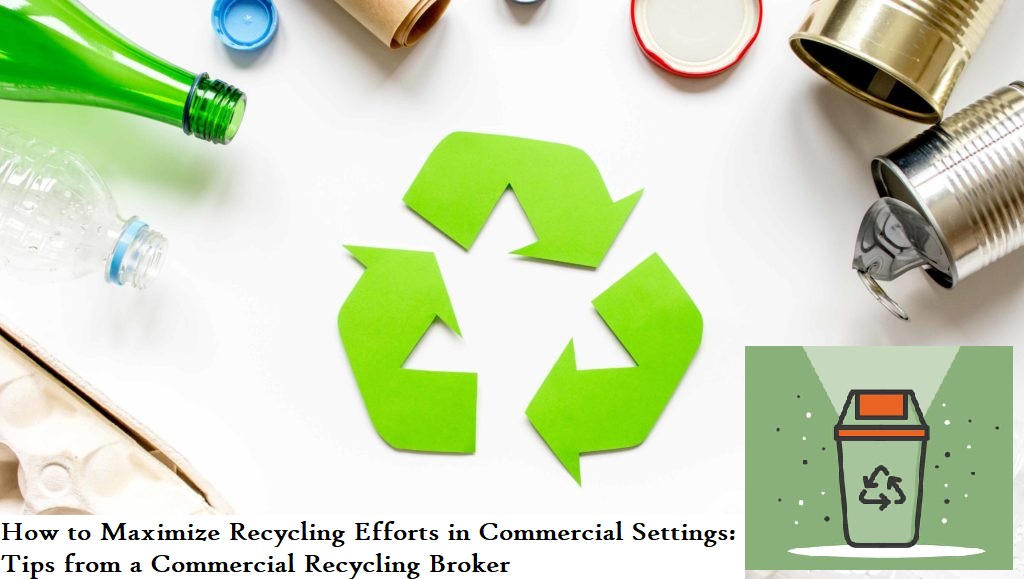
Nowadays, sustainability is more than just a catchphrase in the business world; it’s an essential part of environmental care and corporate responsibility. Efficient waste management and recycling methods are essential for businesses aiming to reduce their environmental impact and make a contribution to a greener future. As a Commercial Recycling Broker, I’ve had the honor of assisting businesses in a variety of industries in maximizing their recycling efforts and implementing sustainable waste management strategies. I’ll provide insightful analysis and useful advice on how businesses may get the most out of their recycling initiatives in commercial environments in this post.
Importance of Recycling in Commercial Settings
It is essential to comprehend why recycling is essential for businesses before getting into particular strategies for maximizing recycling efforts. Recycling helps lessen the negative effects of waste disposal on the environment in addition to conserving precious resources and energy. Recycling materials can help businesses reduce greenhouse gas emissions, preserve natural resources, and safeguard ecosystems by keeping them out of landfills and incinerators. Recycling can also save costs because it lowers the cost of disposing of waste and generates income from the sale of recyclables.
Conducting a Waste Audit and Analysis
To optimize recycling operations, a thorough waste audit and analysis must be carried out first. This procedure entails determining the kinds and volumes of waste your business produces, looking for ways to recycle and reduce waste, and gauging how well the current waste management techniques are working. You may limit waste creation and maximize recycling efforts by developing focused strategies based on a full understanding of your waste stream.
Consider classifying waste into distinct streams, such as paper, cardboard, plastics, metals, and organic waste, during the waste audit. Calculate each waste stream’s volume and evaluate if it may be recycled. Determine which recyclables are currently being disposed of as waste and look at ways to reroute them to recycling centers.
Implementing Source Reduction Strategies
Cutting waste at the source is one of the best strategies to optimize recycling efforts. By using techniques that limit or do away with packing, cut back on excess consumption, and encourage reuse, source reduction strategies seek to reduce the amount of waste produced. Urge staff members to replace single-use disposable products with reusable cups, utensils, and containers. To cut down on waste production, look into chances to buy things in bulk or with minimum packaging.
Whenever feasible, adopting digitization and paperless procedures is another method for reducing sources of pollution. To cut down on the amount of paper and printing supplies used, promote online transactions, document sharing, and electronic communication. Don’t forget to think about enacting regulations in commercial settings to reduce food waste, such as portion control, organic waste composting, and food donations to nonprofits.
Optimizing Recycling Infrastructure
Businesses need access to strong recycling facilities and infrastructure in order to maximize their recycling efforts. To create effective procedures for the collecting, processing, and transportation of recyclable materials, collaborate with trustworthy recycling businesses, waste haulers, and recycling brokers. Make sure your recycling infrastructure can handle the kinds and quantities of recyclable materials produced by your business, and that collection bins are positioned and labeled appropriately for simple recycling separation.
To improve efficiency and simplify the recycling process, think about purchasing on-site recycling equipment including shredders, compactors, and balers. These devices can lower transportation costs, increase the quality of recovered materials, and consolidate recyclables. In order to further maximize recycling efforts and cut expenses, look into options to work with nearby businesses or commercial complexes to share recycling infrastructure and resources.
Educating and Engaging Employees
For any recycling program to be successful, employee engagement is essential. Encourage and enable staff members to take an active role in recycling initiatives by offering incentives, resources, and training. Organize training sessions, workshops, and seminars to spread knowledge about the value of recycling, appropriate waste sorting methods, and the advantages of waste reduction for the environment. Identify recycling champions or create green teams to manage recycling efforts and track advancements to empower staff members to take charge of recycling projects.
Integrate recycling and waste reduction strategies into company policies, values, and corporate social responsibility programs to foster a culture of sustainability and environmental responsibility inside your company. Utilize incentives, recognition programs, and awards to honor and recognize staff members’ contributions to recycling initiatives. Workplace cultures that promote sustainability and maximize recycling efforts can be established by cultivating a sense of communal responsibility and pride in environmental stewardship.
Measuring and Monitoring Recycling Performance
Businesses must periodically measure and assess their recycling performance to guarantee the long-term success and efficacy of recycling initiatives. To monitor the advancement of recycling objectives, such as recycling rates, waste diversion rates, and landfill avoidance, establish key performance indicators (KPIs) and metrics. Establish processes and procedures for tracking the production, gathering, moving, and processing of waste in order to pinpoint areas in need of enhancement and streamlining.
To maximize recycling efforts, evaluate recycling effectiveness, spot trends and patterns, and make data-driven decisions using data analytics and reporting technologies. To promote openness and accountability, distribute recycling performance statistics and progress reports to all relevant parties, such as staff members, managers, clients, and shareholders. Utilize performance analytics and user input to enhance recycling strategies, overcome obstacles, and seize opportunities for growth.
In conclusion, businesses may significantly improve their recycling efforts and reduce their environmental effect by putting these strategies into practice and collaborating closely with a commercial recycling broker. Businesses can pave the way for a greener, more sustainable future for everyone with a determined effort and a dedication to sustainability.
Conclusion
To sum up, in order to maximize recycling efforts in commercial settings, a comprehensive and proactive strategy that includes staff engagement, waste audit and analysis, source reduction strategies, recycling infrastructure optimization, and performance assessment and monitoring is needed. Businesses may reduce their environmental impact, lower the cost of waste disposal, and show corporate responsibility and leadership in sustainability by giving recycling and waste reduction efforts top priority. Encouraging businesses to meet their recycling targets and contribute positively to the environment is my mission as a Commercial Recycling Broker. We can all work together to create a more sustainable and greener future for future generations.

